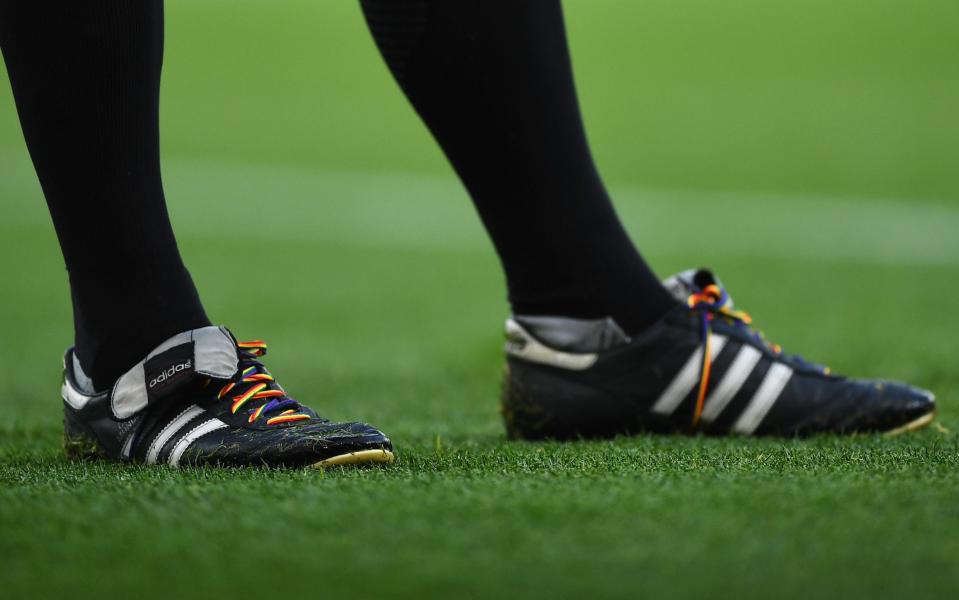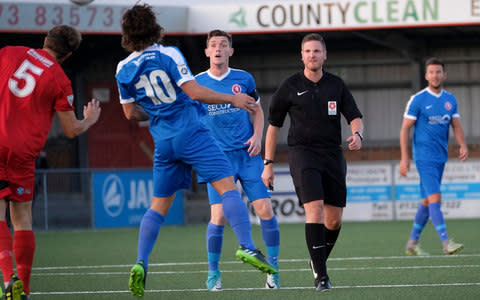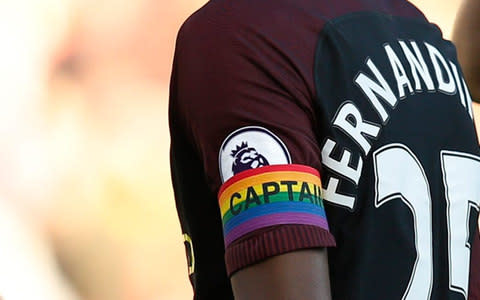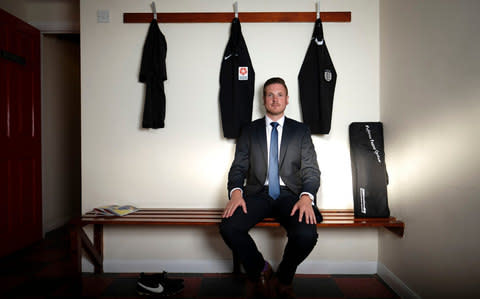First openly gay referee Ryan Atkin says Rainbow Laces is a start, but big-name players must do more

Ryan Atkin recalls a game at Stevenage this season when he was fourth official and afterwards was tweeted by a 12-year-old boy who had recognised Atkin after English football’s only openly gay professional referee spoke publicly about his sexuality for the first time in August.
The message was to tell Atkin that the boy and his father had resolved that if there had been any homophobic abuse from the stands, which there was not, then the two of them would have confronted it on his behalf. It was, Atkin, 32, says, one of the many messages of support he has received since he came out from all across the game and beyond in what has been a largely positive experience for him in a sport which still does not have a high-profile openly gay footballer.
Atkin referees in the sixth tier National League South, as well as some fourth official duties in the Football League and his next game is Watford Under-23s against their Millwall counterparts on Monday. He is a key figure in the Rainbow Laces campaign, supported by The Daily Telegraph, to make all sport, including football, a more welcoming and inclusive environment for LGBT people.
Atkin is clear that while efforts have been made in tackling homophobia, more can be done. “I don’t think as much education has gone into inclusivity and acceptance. We have made great strides when it has come to racism and making sure we treat people from all ethnic backgrounds equally. For me the rainbow laces campaign is about the building blocks to making change.”
Starting with West Ham’s home game against Leicester on Friday night, players will be invited to wear the rainbow laces to “Come out for LGBT” over a 10-day period, with support from Team GB, and governing bodies including those in cycling, rugby and cricket. The Premier League has announced a three-year partnership with LGBT rights campaigners Stonewall to promote equality in the game.

There will be rainbow armbands for Premier League captains and a rainbow theme for the fourth officials’ boards although Atkin, a senior manager with Virgin Trains East Coast in his day job, would like to it to go further with big names in the sport being explicit about their support for LGBT equality. “There are key players in football who could make a difference by saying simply that homophobic abuse and homophobic comments are not acceptable,” he says.
“Gary Lineker wore Rainbow Laces on Match of the Day last year but he didn’t say those words. There are big names like Sir Alex Ferguson, David Beckham, Cristiano Ronaldo but none of them have said it: that if you are going to be homophobic, then don’t participate in sport. It needs people who the younger generation look up to. These are the people who can challenge behaviours.”
On the subject of the first high-profile gay footballer, Atkin points out that the modern players lead very private lives whether they are heterosexual or gay. “They might be comfortable with how they live their lives. How many stories do you read these days about footballers’ lives?
This isn’t Hollywood. Why would they upset the life they have by coming out? It obviously we would be great for the LGBT community but we respect that people don’t have to do it.”

Among the 92 clubs of the Premier League and Football League, only Charlton Athletic have an affiliated LGBT-friendly team who wear the club’s kit and use their training facilities. Charlton Invicta play in the London Unity League and the Kent Sunday Junior Trophy and are run by player-manager Gary Ginnaw, 34, a cost lawyer and lifelong Charlton supporter. “For me having Johnnie Jackson [Charlton’s first team captain] come to our launch and speak on television about us, I’m incredibly grateful for all the club have done.”
Ginnaw came out to family and friends when he was 24 and gave up playing football for his 20s because he did not want the scrutiny around his sexuality that he felt being in a team would bring. Being gay is not a pre-requisite to play for Charlton Invicta, and two-thirds of the team are heterosexual, rather it is a LGBT-friendly environment in which gay players can be certain of acceptance.
“We played one game in the cup and my dad, who is my assistant manager, heard some comments beforehand from the opposition along the lines of ‘This is the gay team, we better watch ourselves’,” Ginnaw says. “After the game their perception was how well we had played. There are a lot of people who don’t know an openly gay man or woman. Until they meet you and speak to you they see we are not a bad team. Then views start to change.”

Ginnaw is a passionate Charlton supporter and feels that the club’s strong history of fan activism means it would have an enlightened attitude towards a gay player, recalling just one incident when he heard homophobic language being used. “When the first big player comes out there might be a backlash,” he says. “The most important thing for him will be that he has the support of his team-mates, the fans and football authorities. In the end fans don’t care who a player is sharing his bed with, they care he’s doing his job well.”
Many clubs now have affiliated LGBT supporter groups, including West Ham’s Pride of Irons which has a 194-strong membership. Their co-chairman Jim Dolan, 36, a banking consultant, says the club have been very supportive and last month they focussed on awareness to counter the potential for homophobic chants in the home game against Brighton and Hove Albion. It went so well that the club received a commendation from the Premier League.
It is the small things that matter to fans: the club stock rainbow merchandise in their official store and for the LGBT Pride event in London in July sent along Hammerhead, the club mascot. “We have many in our group in their 40s and 50s,” Dolan says. “It is not just hip young people trying to change the world, its people who have come to games for years and sometimes put up with some horrible stuff. We are not new, we have always been there.”

